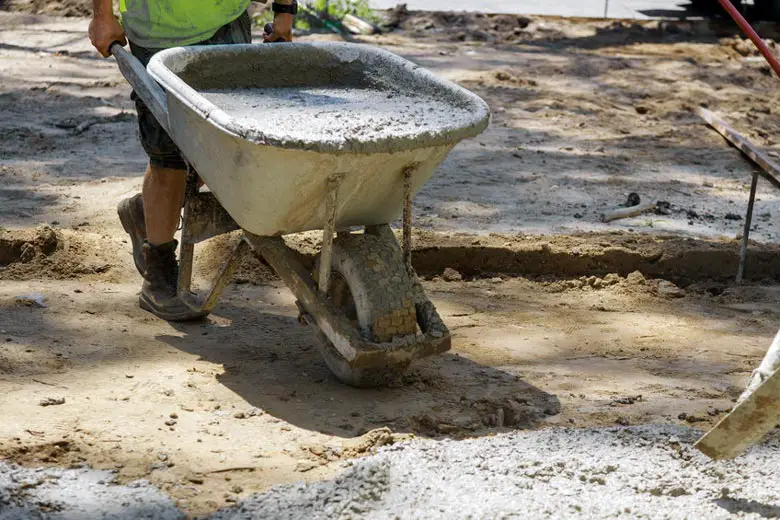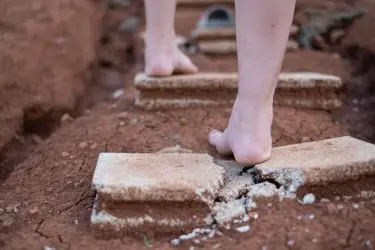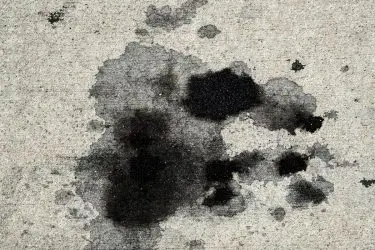Concrete is a long-lasting and incredibly durable building material. Concrete is a mixture of cement, sand, and water poured when wet and cures over time. However, people often wonder whether you can cure concrete when poured under the ground and whether doing so will interfere with the quality of the finish.
Concrete will cure underneath dirt. Although concrete will cure and become firm when poured underneath the ground, the concrete will need to be even and stable to prevent cracking. Therefore, you’ll need to pack down the dirt and keep it even to cure concrete underneath the soil.
Keep reading for a breakdown of the conditions that concrete requires to cure. I will explore how long concrete takes to cure underneath dirt and some of the other effects that occur during the curing process. So, let’s get into it!

Table of Contents
How Long Does Concrete Take To Cure Underneath Dirt?
People often pour concrete underneath the ground, typically as a concrete foundation. However, concrete needs time to cure before you can start building over it or using your new feature. So how long should you leave your concrete to dry when you place it underneath the dirt?
Concrete takes 28 days to cure underneath dirt. Concrete can cure in as little as seven days. However, you should let it settle and harden for four weeks for the best results. If the concrete only needs to support the weight of foot traffic, 48 hours may be enough time to cure underneath dirt.
The time your new subterranean concrete needs to cure varies depending on a few factors.
If your new concrete slab will support the heavy weight or a structure, you should give your concrete about a month to harden. However, if you don’t plan on putting substantial buildings or objects atop it, it may be ready in as little as 24 hours to bear weight.
If you do not allow concrete to cure, you will undoubtedly run into issues. Concrete that does not solidify properly will have weakened durability, strength, and abrasive resistance. Therefore, the concrete will break or degrade quicker than expected.
Will Concrete Cure Underwater?
Concrete requires certain conditions present to allow it to cure. If you don’t control and optimize the requirements, your new piece of concrete may not harden effectively.
Ineffective curing may lead to weakened concrete. So will concrete have all it needs to cure when underwater?
Concrete will cure underwater. Concrete needs water to solidify, and many people spray water over concrete during the curing process. However, not all varieties of concrete may harden when entirely submerged underwater. Concrete containing Portland cement can cure when underwater.
Portland cement is a specific variety of cement that cures when underwater. As a result, when pouring concrete underwater, you must use suitable cement.
Concrete cures so well underwater that some contractors use a technique where you make a frame around a concrete slab that holds a layer of water above the slab as it cures. This technique helps the concrete to cure and set effectively.
Will Concrete Cure Without Air?
Concrete is a unique building material used to construct a range of homes, sheds, and even industrial properties. However, while concrete is all around us, most people are unaware of what it needs to cure and dry. So isn’t it possible to cure concrete when there is no air near the slab?
Concrete will cure without air. Curing concrete in the air is not a very effective process. Concrete cured with air exposure can be 50% as durable as concrete cured in water or other materials. Therefore, concrete cures better when there is no air present.
Oxygen is not integral to the setting of concrete. Since concrete is going through a chemical reaction as it cures, it releases water and moisture, forming a long-lasting concrete slab.
Many concrete curing techniques involve submerging the slab underground or in water. When this happens, you can seal the concrete away from air exposure. This process ensures excellent curing and allows the concrete to form a strong bind.
Will Concrete Cure in Cold Weather?
Concrete curing is a chemical process, and the concrete is not simply drying out. Several environmental factors like moisture or air temperature can affect the concrete curing process. So, does cold weather influence concrete?
Concrete will cure in cold weather when you take specific steps to assist the process. Concrete will not cure effectively below 40 °F (4 °C) without certain added precautions. If you don’t follow these steps, the concrete will not settle properly, resulting in a weakened concrete slab.
The ideal temperature for curing concrete is between 40°F and 60°F (4°C and 15°C).

When it’s at this temperature, concrete will harden at a slow enough rate that allows it to become solid and durable. Therefore, it’s best to cure concrete in temperate conditions to facilitate excellent curing.
How Long Should Concrete Cure Before Building on It?
We often use concrete on the foundations of a variety of structures. Concrete is a durable and long-lasting material, making it ideal for foundations. However, concrete needs some time to cure before it’s ready to support the weight of a structure.
Concrete should cure for at least seven days before building on it. However, the concrete should be left to cure for 28 days. This month-long timeframe allows the concrete enough time to stiffen up and form good bonds, ensuring that the concrete can support the weight of the above structure.
The time that concrete needs to cure before building on top of it will vary depending on the weight and size of your new building, among other factors.
Heavier and larger structures will require more substantial and more durable concrete foundations. On the other hand, since smaller buildings will not need as much structural support, the concrete does not need to cure for as long.
As a result, you should adapt how long you leave your concrete slabs to cure depending on the scale of the building you plan on constructing.
Does Concrete Produce Heat While Curing?
So concrete can cure when it’s underground, underwater, and even in the absence of air. Concrete’s chemical reaction does best when it is out of the air, but that means that you’ll have to seal it away to see the best results.
Concrete does produce heat while curing. The water and cement present in concrete interact, causing chemical reactions. This reaction has an exothermic effect which means that it emits heat. Concrete can release a substantial amount of heat depending on its makeup and fineness.
Heat is a common side effect of many chemical reactions. The heat released from concrete during curing varies. However, typically concrete will increase by 10°F to 15°F (-12°C and -9°C) per 100 pounds (45 kg) of cement within the mixture while it cures.
Therefore, concrete slabs may feel warm to the touch when they are in the process of curing as curing emits heat from the building material.
Final Thoughts
Concrete is an excellent and versatile building material that can effectively cure when underneath dirt. Concrete can also excellently cure underwater and without air present. Depending on the cement used inside the concrete mixture, you can even cure concrete in cooler climates with relative ease.
You should cure concrete for at least one to two days for slabs that will support little weight like foot traffic only. However, if your concrete slab will support additional weight, you should allow it to cure for at least seven days, with 28 days being the ideal time.



